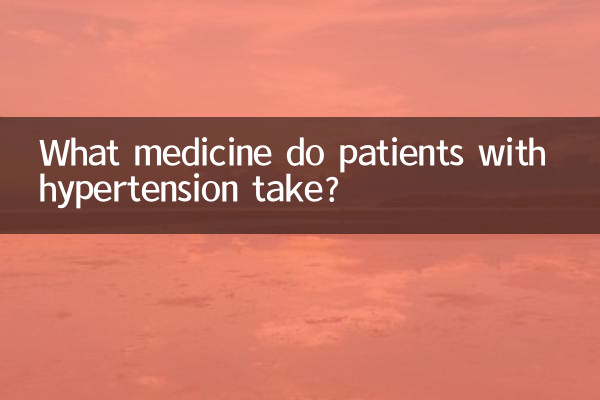What medicine should patients with high blood pressure take?
Hypertension is a common chronic disease, and long-term poor control may lead to serious consequences such as cardiovascular and cerebrovascular diseases. For patients with hypertension, rational use of medication is the key to controlling blood pressure. This article will combine the hot topics and hot content on the Internet in the past 10 days to give you a detailed introduction to the types of drugs commonly used by patients with hypertension, their mechanisms of action and precautions, and provide structured data for reference.
1. Classification and mechanism of action of hypertension drugs

Hypertension drugs are mainly divided into five categories, each with different mechanisms of action and applicable populations. The following are the classification and characteristics of common high blood pressure drugs:
| drug type | Representative medicine | Mechanism of action | Applicable people |
|---|---|---|---|
| diuretics | Hydrochlorothiazide, furosemide | Reduce blood volume and lower blood pressure by promoting urination | Senile hypertension, isolated systolic hypertension |
| Calcium channel blockers (CCB) | Amlodipine, nifedipine | Inhibit calcium ions from entering vascular smooth muscle and dilate blood vessels | Hypertensive patients with atherosclerosis |
| Angiotensin-converting enzyme inhibitor (ACEI) | Captopril, enalapril | Inhibit angiotensin production and reduce peripheral vascular resistance | Hypertensive patients with diabetes and heart failure |
| Angiotensin II receptor blockers (ARBs) | Losartan, Valsartan | Blocks the effects of angiotensin II, lowering blood pressure | Patients who are intolerant to ACE inhibitors |
| beta blockers | Metoprolol, Bisoprolol | Inhibit sympathetic nerve activity and slow down heart rate | Hypertensive patients with coronary heart disease and arrhythmia |
2. Principles for Selection of Hypertensive Drugs
The selection of hypertension drugs needs to be comprehensively considered based on the patient's individual situation, comorbidities, drug side effects and other factors. The following are several principles for selecting high blood pressure medications:
1.individualized treatment: Different patients have different blood pressure levels, ages, and comorbidities, and the medication plan needs to be customized.
2.Prefer long-acting preparations: Long-acting antihypertensive drugs (such as amlodipine, valsartan) can control blood pressure stably and reduce fluctuations.
3.Combination medication: For patients with poorly controlled blood pressure, the combination of two or more drugs (such as ACEI + diuretics) may be considered.
4.Be aware of drug side effects: For example, diuretics may cause hypokalemia and beta-blockers may cause bradycardia.
3. Recent hot topics on hypertension drugs
According to the hot content on the Internet in the past 10 days, the following are the hot discussions related to high blood pressure drugs:
| hot topics | Main content |
|---|---|
| Potential of new antihypertensive drugs SGLT-2 inhibitors | Studies have found that SGLT-2 inhibitors (such as dapagliflozin) may have additional benefits in patients with hypertension and diabetes. |
| Hypertension drug resistance issues | Some patients have reduced efficacy after taking the same antihypertensive drug for a long time and need to adjust their medication regimen. |
| Controversy over traditional Chinese medicine for lowering blood pressure | Some traditional Chinese medicines (such as Gastrodia elata and Uncaria elata) are considered to have antihypertensive effects, but they lack large-scale clinical verification. |
4. Medication precautions for patients with hypertension
1.Monitor blood pressure regularly: It is recommended to measure blood pressure every morning and evening and record the changing trend.
2.Take medication as directed by your doctor: Do not increase or decrease the dosage or stop the medicine at will to avoid blood pressure fluctuations.
3.Pay attention to drug side effects: If symptoms such as dizziness, fatigue, cough, etc. occur, seek medical treatment in time.
4.lifestyle intervention: A low-salt diet, moderate exercise, quitting smoking and limiting alcohol can help control blood pressure.
Conclusion
The drug treatment of hypertension is a long-term process. Patients need to choose appropriate drugs under the guidance of a doctor and adhere to a healthy lifestyle. Through scientific medication and comprehensive management, the blood pressure of most patients with hypertension can be effectively controlled, thereby reducing the risk of cardiovascular and cerebrovascular diseases.

check the details

check the details